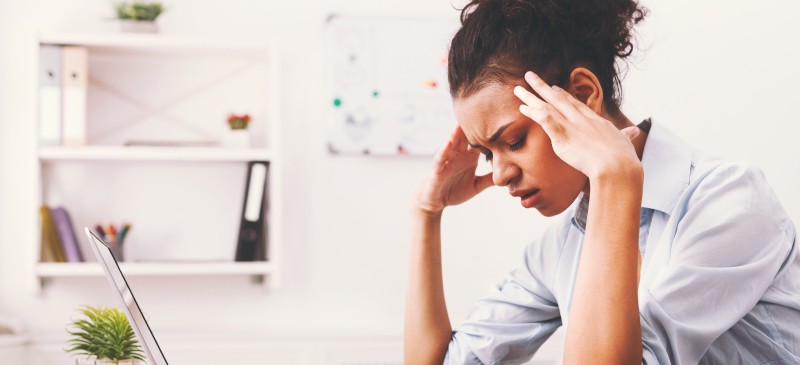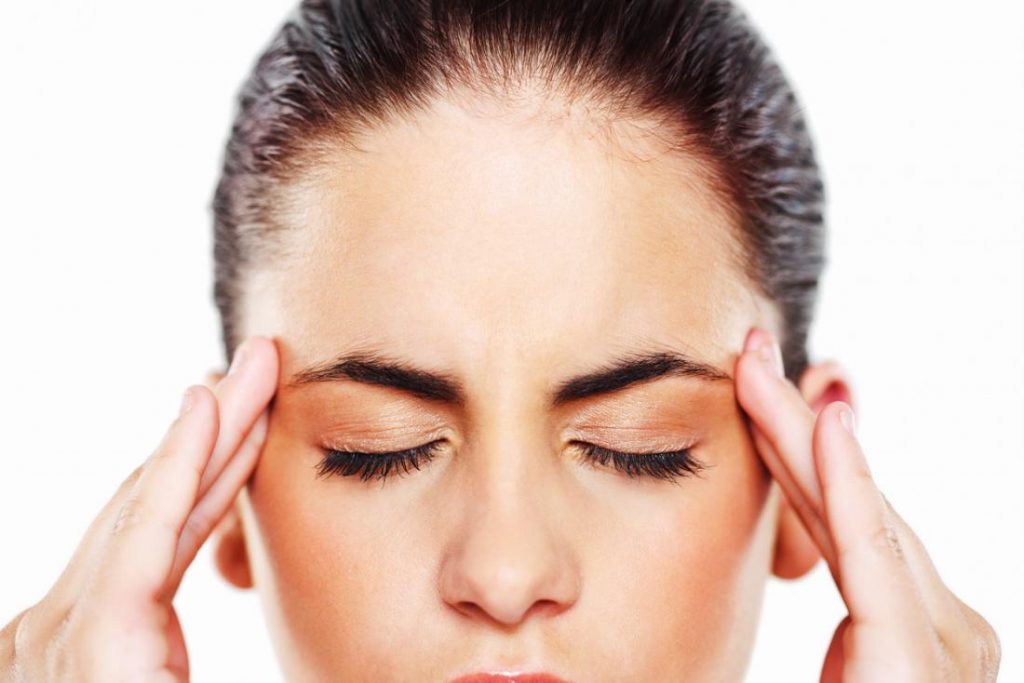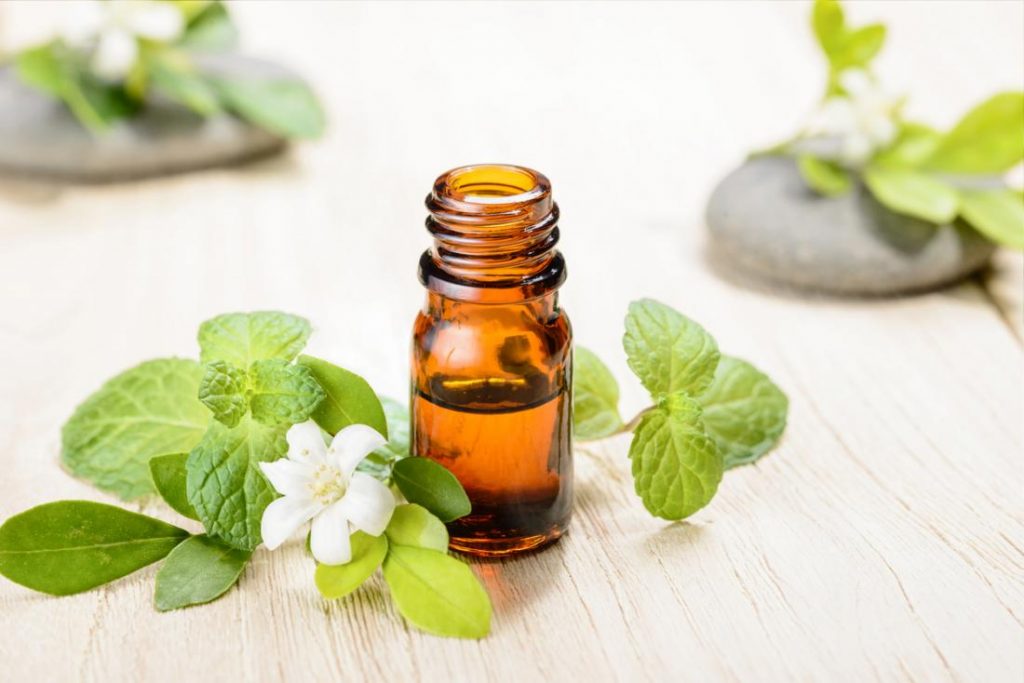There are many kinds of headache and many causes, but they all have one thing in common. They hurt. Headaches have long fueled the market for pain medications, but all pain medications can harm more than they help if used too frequently. Overuse of pain medication for headaches is so common that it is now considered to be a major cause of chronic headaches. There is a better way. Use Aromatherapy for headache relief to reduce your dependence on drugs and to avoid their risks and side effects.

Types of headache
About 90% of headaches are categorized as primary as there is no underlying medical cause. Secondary headaches are caused by a tumor, infection, an injury, or some other medical condition. Although there are many kinds of primary headaches, the most common ones are classified either as tension-type headaches or migraines.
The tension-type headache
Tension-type headaches are by far the most prevalent with about 3 in 4 persons suffering at least one significant headache a year. About 55% of sufferers are women. The pain is typically mild to moderately intense although occasionally it may be severe. It occurs on both sides of the head, but it may even involve the front and the back as well. It tends to be a steady, pressing kind of pain.
Unlike migraines, tension-type headaches are not worsened by physical activity, so we absorb their impact and keep on going. But they certainly take the shine out of life. Usually the headache is accompanied by a tightness of the muscles in the neck and shoulders, a loss of appetite, difficulty in concentrating, trouble sleeping and irritability.

The frequency and duration of tension-type headaches is quite variable. They may be over in a few minutes or last for more than a week. They typically last between 4 and 6 hours. Headaches are considered to be chronic if they occur on more than 15 days in a month for at least six consecutive months. Chronic headaches are a serious health problem because they are difficult to treat and can persist for years.
Headache triggers
Research has not unraveled the exact cause of tension-type headaches, but certain triggers are well known. The most common are emotional or psychological stress, muscle strain in the neck and back caused by poor posture, eye strain caused by tired, dry eyes, sleep deprivation, jetlag, and hunger from irregular or missed meals. With our modern, fast paced, over-committed lifestyles, we are all prone to experience these triggers.
Seeking professional medical help
The majority of headache sufferers do not consult their doctor but there are times when it is clearly the responsible thing to do. If you begin to experience headaches with no apparent reason, your doctor should investigate the cause. If your headaches are severe and sometimes debilitating, you need profession help. If you suffer chronic headaches, you need advice on how to cope with the higher risks of medication side effects and medication overuse headaches.
Painkillers, side effects and rebound headaches
Most tension-type headaches are treated with analgesics, which are a class of drugs used to relieve pain. The main analgesics include nonsteroidal anti-inflammatory drugs (NSAIDs) such as ASA and ibuprofen; acetaminophen; and narcotics. These drugs are effective in relieving the pain of tension-type headaches, but all carry the risk of serious side effects and lead to rebound headaches if used excessively or too frequently.

Taking pain medication for more than fifteen days a month is considered to be overusing the medication. In this situation rebound headaches, which are now called medication overuse headaches, are quite likely to occur. Your body adapts to the medication and when you try to reduce or eliminate your usual dosage an MOH is triggered which may be more severe than the original headache condition. The normal response is to take more pain medication for the headache. This cycle repeats and insidiously your frequent headaches have transformed into chronic daily headaches and you are dependent on the medication. You must stop taking the medication in order to stop the overuse headaches.
If you suffer from chronic headaches, your risk of MOH is high. You experience headaches more frequently than can be treated safely with pain medication.
Aromatherapy – an alternative to drugs
Aromatherapy can be used effectively to complement or even replace pain medication. Your goal should be to use the least number of drugs and use them as seldom as possible.
Tension-type headaches are effectively relieved with a number of analgesic essential oils and two of the best are Lavender and Peppermint. Either may be used separately or they may be mixed in equal proportions, as many find the blend to be more effective.
Lavender essential oil is relaxing and when used at bedtime helps to promote sleep which is normally difficult with a headache. Peppermint is stimulating and when used alone or blended with Lavender will help to overcome fatigue and lethargy. It will also alleviate upset stomach and nausea and help to restore your appetite. Rosemary is another good choice as it will help improve your ability to concentrate while relieving the headache pain.
There are several ways to administer these essential oils but two of the most convenient are with the use of a personal inhaler or by rubbing a few drops of oil blended with carrier oil on the temples and back of the neck.
Headaches that are caused by stiff muscles in the neck and shoulders can be treated with a massage using Marjoram essential oil. Marjoram is a vasodilator and it will relax the muscles and increase blood flow to the brain.
Preventing tension-type headaches
For most of us, tension-type headaches are triggered by the stresses and demands of a hectic life. Changing your lifestyle will not only reduce the frequency of headaches but will improve the quality of your life as well.
Be more conscious of your health. Strive to maintain regular patterns for eating and sleeping and maintain a regimen of moderate exercise. Stay within your limits, do not over commit, and set aside time for relaxation. Meditation and Aromatherapy can help. Identify your headache triggers and endeavor to avoid them or lessen their effect on you.
When you feel the onset of a headache, use Aromatherapy to alleviate the pain and relax you. Take pain medication only as a last resort.



